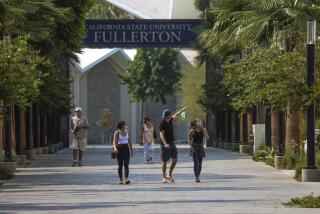Alternative UC tuition plan attracts interest
UC Riverside students received a dose of validation Wednesday from system President Mark G. Yudof over their radical plan to abolish tuition and replace it with post-graduation payments equaling 5% of their income for 20 years.
Speaking at a UC regents meeting on the Riverside campus, Yudof said he was “very impressed” with the proposal — despite the obstacles it would face in implementation. “We think the ideas are constructive,” Yudof said, promising that his staff would study the plan.
His comments were a triumph of sorts for Chris LoCascio, a UC Riverside student who has led an effort to find an alternative to skyrocketing tuition and a way to cope with shrinking state education revenues.
LoCascio’s group, called Fix UC, released a no-tuition proposal last week that instead would require most graduates to pay 5% of their wages (not investments) for two decades. It would offer discounts for transfer students, graduates who work in public service careers and those who stay and work in the state.
Students from other states and nations would pay 6% a year. The plan also provides a way to include dormitory costs and for those who are unemployed to skip payments.
Current tuition is $12,192 for California undergraduate students — not including room, board and campus fees. LoCascio, who is editor of the Highlander campus newspaper, said the proposal would ease students’ financial struggles and, within a few years, provide more money to expand enrollment and faculty.
Although the plan’s financial details impressed UC officials, they said its vague ideas for payment enforcement were a problem.
Also on Wednesday, the regents said they would move their May 16 meeting from a traditional campus setting to Sacramento to join a rally the next day seeking more funding for higher education.
That announcement came as the regents began discussing Gov. Jerry Brown’s proposal for next year’s state budget.
Under Brown’s plan, UC would receive about $90 million more than this year, mainly to help pay for pension costs. But its state funding still would be $660 million less than the 2010-2011 school year. If Brown’s proposed tax increases fail at the ballot, UC faces more deep cuts.
“Unless our elected representatives start funding us at a realistic level, UC’s ability to serve the state and its citizens will be at serious risk,” regents Chairwoman Sherry Lansing said.
More to Read
Start your day right
Sign up for Essential California for news, features and recommendations from the L.A. Times and beyond in your inbox six days a week.
You may occasionally receive promotional content from the Los Angeles Times.







